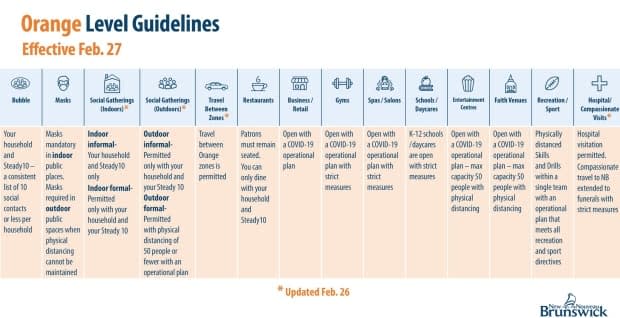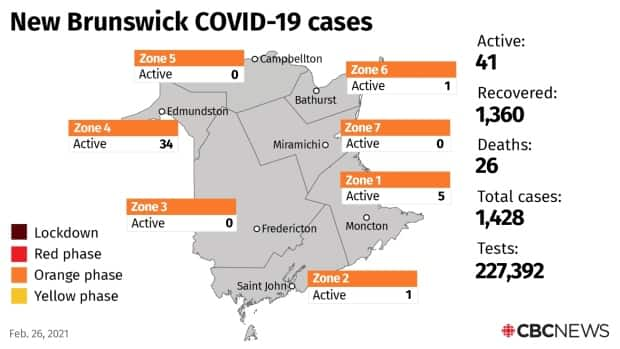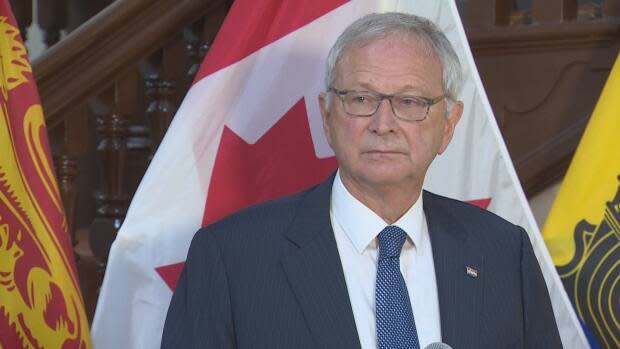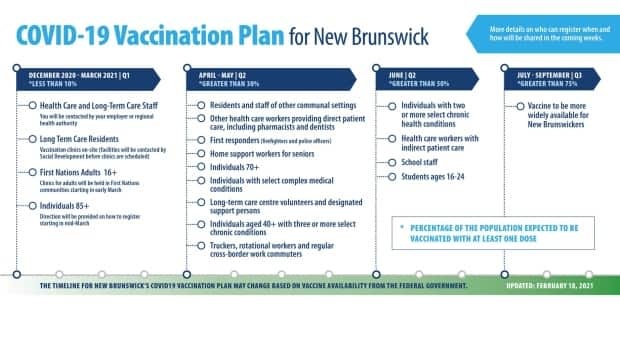N.B. COVID-19 roundup: Entire province set to move to 'a new yellow' soon

The entire province is just over a week away from rolling into the less-restrictive yellow phase, Dr. Jennifer Russell said Friday.
The chief medical officer of health said there have been "far fewer cases, fewer hospitalizations and no new outbreaks, and one day this week we had zero cases."
"These are encouraging signs," Russell said. "But everyone wants to know: when are we going to yellow? I'm here today to tell you that yellow is coming … all health zones should be ready to move to the new yellow alert level on Sunday, March 7."
However, she said, because of the presence of variants, it would be "a different yellow" than last time.
This time, people are being asked to limit their contacts to a steady 15, down from 20 under previous yellow phase rules. The steady 15 can include people from another health zone, and travel to visit them will be permitted.
"The fewer contacts each person has, the better," Russell said. "This is so very important."
A full list of the new rules has been posted on the government's gnb.ca website.
Premier Blaine Higgs also addressed the briefing and, like Russell, urged caution as the province prepares to enter the yellow phase.
"The variants are still a serious threat," Higgs said, and if cases rise and outbreaks begin to take hold, "we could move from yellow to a straight lockdown."
Russell agreed, noting that "a lot can happen in nine days."
If there is a sudden increase in cases in the week ahead, she said, the plan to move to yellow will be paused and "we will keep all zones at the orange level."
Russell also announced one new case on Friday, an individual 20 to 29 years old in the Moncton region, Zone 1.

Hospital visits allowed as of midnight Friday
Under adjusted orange phase rules, visits to hospital patients will be permitted as of midnight Friday night, Premier Blaine Higgs says.
Higgs noted visits would be allowed, with public health measures in place, if the facility has the capacity to allow this under its operational plan.
"We will work with these facilities to ensure this is possible," he said the COVID briefing Friday.
The issue has increasingly made headlines, including a recent CBC News story about a mother who was not allowed to see her dying son, and another about an 80-year-old who was kicked out a hospital for holding her husband's hand.
Visits to residents of long-term care facilities are also on the horizon, once the majority of staff and residents have received both doses of the COVID-19 vaccine, Higgs said.
Looking good for a summertime Atlantic bubble
Dreaming of getting back into the bubble? It could happen, Premier Blaine Higgs says.
Asked Friday if the easing of restrictions announced at Friday's COVID-19 update could lead to the return of inter-Atlantic travel, Higgs noted "any progression from orange to yellow brings us closer to the Atlantic bubble option."
There are no immediate plans to change the 14-day self-isolation restrictions, he said, "but I would definitely say" that dwindling case numbers combined with increased vaccine supply is "directionally right, without question."
"So at this stage, the Atlantic bubble as we once knew it is a definite possibility for late spring or summer."

A different shade of yellow
The province is poised to move to the yellow phase of recovery at 11:59 Sunday, March 7, with some changes to previous yellow phase rules:
Residents will be allowed to expand their steady 10 to a steady 15 list of contacts. The steady 15 may visit venues together, including restaurants.
Sports teams will be allowed to play within their leagues across zones, while following their operational plans.
Formal indoor gatherings will be allowed with an operational plan, at 50 per cent capacity or less.
Formal and informal outdoor gatherings of 50 people or fewer will be allowed with physical distancing.
Masks will still have to be worn in indoor spaces but will not be needed outdoors.
Mask-wearing in schools will depend on the school's operational plan.
Further details about the updated yellow level are available on the government's gnb.ca website.
Orange rules also getting a makeover
Orange rules are getting a bit of a squeeze ahead of the planned provincewide move to yellow. The changes, effective at midnight Friday night, include:
Travel between orange zones will be permitted and residents may include people from other orange zones in their steady 10 contacts.
Visits will be allowed in hospitals, according to regional health authority policy and guidelines.
Compassionate travel exemptions, with Public Health pre-approval, will be extended to people living outside New Brunswick who are entering the province to attend a funeral. Public Health guidelines will have to be followed, including a mandatory five-day self-isolation and a negative COVID-19 test upon arrival.
Further details about the updated orange level are available on the government's gnb.ca website.

Province gets bumped-up vaccine supply commitments
New Brunswick should begin seeing significantly ramped-up vaccine deliveries within weeks, Premier Blaine Higgs says.
In an interview Friday on Information Morning Fredericton, Higgs said he has received confirmation that the province will start getting 15,000 doses a week of the Pfizer-BioNTech vaccine, beginning in mid-March.
Supply of the Moderna vaccine is also expected to stabilize, he said.
Higgs said he's confident that with the increased supply, and a team of about 11,000 people with the skills needed to administer it, the province will be able to start offering more COVID-19 vaccines.
"We have demonstrated doing 40,000 [vaccines] a week and we think we can do double that," said Higgs.
But Interim Leader Roger Melanson and other members of the province's all-party Covid-19 cabinet committee said there are still unanswered questions.
Melanson said he's was pleased to hear news of the stabilizing supply and to see the province release guidelines about who will be getting the vaccine, and when.
But he's concerned about the lack of information around how appointments will be arranged.
"How can they register? How can they make appointments? Who do they call? Who's going to communicate with them? The whole issue around how people can get vaccinated is critical," Melanson said.

Appointment not much good without available vaccine: Higgs
British Columbia and Alberta health departments have already begun taking appointments for vaccines.
Higgs isn't convinced that's the right move for New Brunswick at the moment.
"I know it looks good to get and have appointments, but I also heard the discussions about 'I can get an appointment, but I don't know that I've got a vaccine,' " said Higgs.
"When we schedule appointments, we will have a vaccine to put with it."
Green party Leader David Coon said he thinks the province is a victim of the federal government's per capita plan to distribute vaccines, which doesn't take into account the province's aging population.
"It seems to me that if the distribution had been based on a per capita senior formula, we would have had already the sufficient amounts of vaccine to fully vaccinate our elderly population," said Coon.
People's Alliance Leader Kris Austin said the province is in a difficult position, and it's hard to effectively distribute a vaccine when the supply isn't there.
"Unfortunately, New Brunswick is receiving the trickle of supply and trying to manage that trickle for the population here in this province," said Austin.
What to do if you have a symptom
People concerned they might have COVID-19 symptoms can take a self-assessment test online.
Public Health says symptoms shown by people with COVID-19 have included:
A fever above 38 C.
A new cough or worsening chronic cough.
Sore throat.
Runny nose.
Headache.
New onset of fatigue, muscle pain, diarrhea, loss of sense of taste or smell.
Difficulty breathing.
In children, symptoms have also included purple markings on the fingers and toes.
People with one of those symptoms should:
Stay at home.
Call Tele-Care 811 or their doctor.
Describe symptoms and travel history.
Follow instructions.

